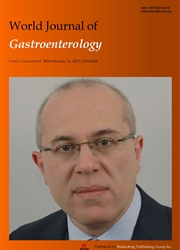

 中文摘要:
中文摘要:
AIM:To explore the efficacy of PCI-24781,a broadspectrum,hydroxamic acid-derived histone deacetylase inhibitor,in the treatment of gastric cancer(GC).METHODS:With or without treatment of PCI-24781and/or cis-diamminedichloroplatinum(CDDP),GC cell lines were subjected to functional analysis,including cell growth,apoptosis and clonogenic assays.Chromatin immunoprecipitation and luciferase reporter assays were used to determine the interacting molecules and the activity of the enzyme.An in vivo study was carried out in GC xenograft mice.Cell culture-based assays were represented as mean±SD.ANOVA tests were used to assess differences across groups.All pairwise comparisons between tumor weights among treatment groups were made using the Tukey-Kramer method for multiple comparison adjustment to control experimental-wise typeⅠ error rates.Significance was set at P【0.05.RESULTS:PCI-24781 significantly reduced the growth of the GC cells,enhanced cell apoptosis and suppressed clonogenicity,and these effects synergized with the effects of CDDP.PCI-24781 modulated the cell cycle and significantly reduced the expression of RAD51,which is related to homologous recombination.Depletion of RAD51 augmented the biological functions of PCI-24781,CDDP and the combination treatment,whereas overexpressing RAD51 had the opposite effects.Increased binding of the transcription suppressor E2F4 on the RAD51 promoter appeared to play a major role in these processes.Furthermore,significant suppression of tumor growth and weight in vivo was obtained following PCI-24781 treatment,which synergized with the anticancer effect of CDDP.CONCLUSION:These data suggest that RAD51 potentiates the synergistic effects of chemotherapy with PCI-24781 and CDDP on GC.
 同期刊论文项目
同期刊论文项目
 同项目期刊论文
同项目期刊论文
 Evodiamine synergizes with doxorubicin in the treatment of chemoresistant human breast cancer withou
Evodiamine synergizes with doxorubicin in the treatment of chemoresistant human breast cancer withou Piperlongumine induces apoptosis and synergizes with cisplatin or paclitaxel in human ovarian cancer
Piperlongumine induces apoptosis and synergizes with cisplatin or paclitaxel in human ovarian cancer Epigallocatechin-3-gallate potentiates the effect of curcumin in inducing growth inhibition and apop
Epigallocatechin-3-gallate potentiates the effect of curcumin in inducing growth inhibition and apop Synergistic anticancer effects of triptolide and celastrol, two main compounds from thunder god vine
Synergistic anticancer effects of triptolide and celastrol, two main compounds from thunder god vine Cyclin-dependent kinase inhibitor dinaciclib potently synergizes with cisplatin in preclinical model
Cyclin-dependent kinase inhibitor dinaciclib potently synergizes with cisplatin in preclinical model Double-positive expression of high-mobility group box 1 and vascular endothelial growth factor C ind
Double-positive expression of high-mobility group box 1 and vascular endothelial growth factor C ind Overexpression of GOLPH3 is associated with poor prognosis and clinical progression in pancreatic du
Overexpression of GOLPH3 is associated with poor prognosis and clinical progression in pancreatic du Small interfering RNA (siRNA)-mediated knockdown of macrophage migration inhibitory factor (MIF) sup
Small interfering RNA (siRNA)-mediated knockdown of macrophage migration inhibitory factor (MIF) sup Correlation between epidermal growth factor receptor and tumor stem cell markers CD44/CD24 and their
Correlation between epidermal growth factor receptor and tumor stem cell markers CD44/CD24 and their 期刊信息
期刊信息
